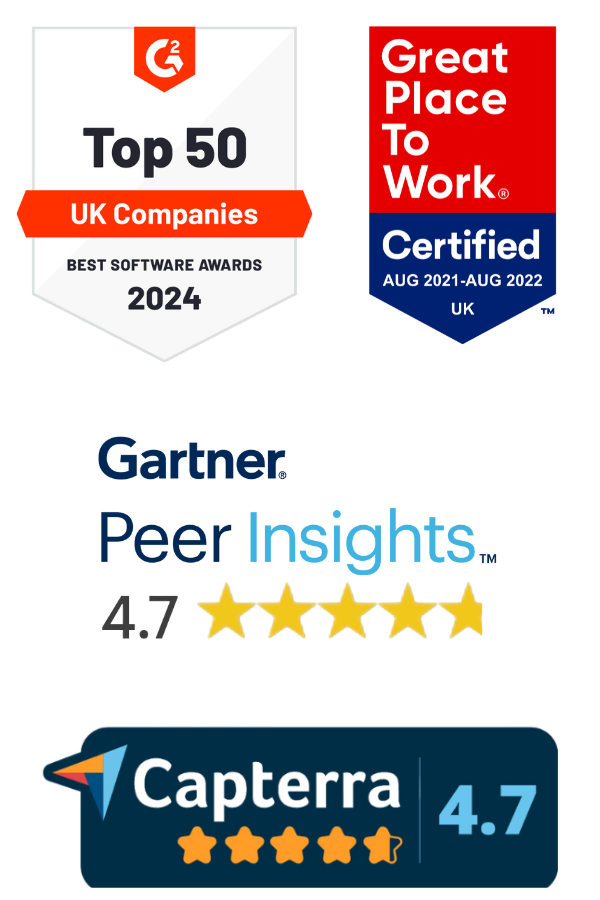
Stocks, stocks, stocks…
The wonderful and unpredictable world of trading 📊
If you’re here, reading this, you might be an expert.
You might be a total novice.
Or you might even be a more casual investor.
No matter your expertise, we wanted to delve into unchartered territory.
And tackle a question that’s been front of mind for us for a while:
Is there a link between stock price and a company’s social media presence?
And by that, I don’t mean posting to their company page every other day.
I’m talking about the people behind the brand – their employees 👏
Can a workforce make a positive impact on stock price in the “de facto town square” that social media has become?
Jump to:

What Causes a Company’s Stock Price to Change?
The short answer is that a stock’s price goes up and down depending on supply and demand. If there is high demand for a stock, and more people are buying it than selling it, then the price goes up.
Conversely, if there is low demand for a stock and no one is buying it, then the supply is high and therefore the price is low.
So, with that said, perhaps the more appropriate question to ask is: what affects demand for a stock? 🤔
Now, I’m no Warren Buffet, but even the industry experts of the trading world know that it’s not something that has one single answer.
Demand for a company’s stock is influenced by news about the company. For example, if a company releases their EOY earnings and they’re overwhelmingly positive, then the demand will go up because said company is suddenly looking like a great financial investment.
However, there could be bigger factors at play and things outside of the company’s control can seriously affect demand for their stock.
For example, when the COVID-19 pandemic hit, retail companies suffered because investors knew that the company’s earnings would drop and so then would the returns. As a result, stock in this industry (and a bunch of others) suffered tremendously, while stock in the e-commerce sector boomed 🚀
More recently, and much more to my interest, companies’ stock prices have been seriously impacted by the social media presence of both their senior and non-senior employees.
Just recently, prior to announcing his plans to buy the company, it was revealed that Elon Musk had bought a majority 9.2% stake in Twitter. Causing the greatest intraday surge in their share price since their IPO listing in 2013.
Of course, not every company has an Elon or his devout following, but every company has a team of senior leaders who wield tremendous influence over their audiences and, in turn, their stock price. Employee influence is our forté, and we call this kind ‘Executive Influence’.

The Power of Executive Influence
Nowadays, buyers want trust, operational transparency, and authenticity from companies. The stock market is especially focused on trust and operational transparency as buyers have to believe a company will go on to succeed if they’re to invest in it. It’s all psychology.
Trust comes with knowing the people you’re really dealing with. The people, the names and the faces behind the company name and logo. Having them visible in the public domain (social media) is absolutely essential if you’re going to build trust among your audience of potential investors 💪
You’d better believe it’s not just the senior leaders too. Sure, it might take an audience size of Elon Musk’s calibre to increase a company’s worth by billions of dollars, but every employee has the potential to influence their audience, and collectively, employees have the power to influence public opinion of the company (more on this later!)
So, where’s the research?
Can we validate this claim?
Or is it all just hearsay?
Well, we decided to take matters into our own hands… 👇

The Social Media Presence of Unicorn Companies
If you’re new to DSMN8 or if you weren’t aware, we regularly produce industry-specific research on employee advocacy to determine which companies have the most active employees on social media.
We produce reports on each industry that highlights the % of each company’s employees that posted to social over a 30-day period. We then use this data to calculate the industry average.
We’ve been doing this for the past two years and, to date, we have pulled data on hundreds of thousands of companies across over 90 different industries 📚
Recently, we decided to go big. We compiled a list of companies with “unicorn” status (valued at $1+ billion) and got to work doing what we do best!
Our findings tell a very interesting story!
The highest-ranking company had a staggering 58.14% of their employees share to social media over a 30-day period… which is the highest score we have ever seen 📈
What’s more is that the average % of employees who shared over a 30-day period was 18.56%. Not to sound like a broken record here, but that is also the highest average we have ever seen. A reminder here, we have researched nearly 100 industries.
It’s also worth noting that at the end of 2021, we compiled the data that we pulled across all industries we analysed that year… the average share rate across ALL industries was just 5.95%.
Total % of
Employees Who Shared
The % of employees who shared at the #1 ranked company.
58.14%
18.65%
Average % of
Employees Who Shared
The average monthly employee share rate across all companies included.

Why You NEED to Activate Your Employees on Social
So, while we can’t say with absolute certainty that having a workforce that is active on social will directly influence a company’s stock price, we can point a finger at the companies with the highest valuations in the world and say that this is something that they’re doing extremely well. Something that this group of companies is doing better than ANY single industry we’ve looked at.
Now, I’m not going rogue here and suggesting that an employee advocacy program is your ticket to untold riches and unicorn status, but is it so outrageous to suggest that it might just be a piece of the puzzle? Something that they’re doing right that we can all learn from? 🙏
Sure, it could be a coincidence, but I’m not taking any chances! 😉
Frankly, if you know enough about employee advocacy and the power of employee influence, it becomes easy to see why it has become the strategy of champions.
An employee advocacy program has the potential to build your brand awareness in a way that no form of paid promotion can compete with.
Essentially, you’re able to reach (on average) an audience that is ten times the size of your company’s social following through your employees.
How?
Well, the average employee has 1,180 connections (a combination of connections, friends and followers) across social media.
So, if you have 50 employees share a piece of your content with their networks, you’re able to reach over 50,000 people.
Hyper-relevant side note: Most employee advocacy programs have a couple of hundred employees involved… minimum. Many DSMN8 clients have thousands. That’s a pretty big audience!
What’s more, you’re able to #ActivateYourElons on social media and demonstrate your company culture at scale by sharing messages through the people who your audiences want to hear from.
Authenticity? Check.
Building trust? Check.
Demonstrating operational transparency? Check! ✅
Gartner predicts that by 2023, 90% of B2B brands will incorporate scaled employee advocacy programs into their marketing strategies.
Evidence suggests that the companies that achieved unicorn status did something right, and it seems the rest of us have started to take notice!
Ready to get started with employee advocacy?
But not sure if you’re ready for a platform?
Schedule a call with one of the team.
Prefer to cut to the chase and explore DSMN8?
Roger that!
More DSMN8 Content You Might Enjoy!
Lewis Gray
Senior Marketing Manager and Employee Advocacy Program Manager at DSMN8. Lewis specialises in content strategy, growing brand visibility and generating inbound leads. His background in Sales lends itself well to demand generation in the B2B niche.



